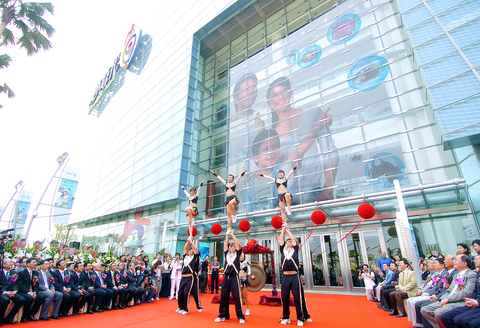Hoping to steal some of the limelight from fashion outlet-packed Taipei, the Dream Mall (
The new shopping mall is the nation's largest, with a floor space of 121,000 ping (399,300m2), the sixth-largest in Asia and the 11th largest in the world.
The mall rises nine stories and has three basement levels and has roped in Japan's Hankyu Department Store; Japan's largest lifestyle and home-furnishing brand, Nitori; the UK's Marks & Spencer; and a sub-zero temperature playground introduced from Japan so subtropical Taiwanese can experience a winter wonderland.

PHOTO: HUANG CHIH-YUAN, TAIPEI TIMES
All of these retailers will make their Taiwan debut at the Dream Mall.
However, Hankyu Department Store, Marks & Spencer and Nitori will not open their doors for business until May 12, when a grand opening ceremony is scheduled.
Dream Mall president Paul Chang (
Chang predicted that the mall, which took an investment of NT$18.5 billion, would break even within three years and start pulling in profits in ten years.
Another much-anticipated feature is the mall's NT$200 million rooftop Ferris wheel, whose 36 carts are painted with Sanrio Co's famous cartoon figures, including Hello Kitty, Cinnamoroll Dog and Badtz-Maru penguin.
The firm said it is the only Ferris wheel in Taiwan with a view of the ocean.
Taipei's Miramar Entertainment Park (美麗華百樂園) in Dazhi District also banks on its rooftop 48-cart Ferris wheel, the second-largest in the world after the wheel atop the Hip Five shopping center in Osaka, Japan, as a draw for those curious to get a bird's eye view of the greater Taipei area.
Statistics show that Kaohsiung's department store and shopping mall market is worth about NT$22 billion per annum. Hanshin Department Store takes the lion's share with sales of NT$10 billion a year.

‘SWASTICAR’: Tesla CEO Elon Musk’s close association with Donald Trump has prompted opponents to brand him a ‘Nazi’ and resulted in a dramatic drop in sales Demonstrators descended on Tesla Inc dealerships across the US, and in Europe and Canada on Saturday to protest company chief Elon Musk, who has amassed extraordinary power as a top adviser to US President Donald Trump. Waving signs with messages such as “Musk is stealing our money” and “Reclaim our country,” the protests largely took place peacefully following fiery episodes of vandalism on Tesla vehicles, dealerships and other facilities in recent weeks that US officials have denounced as terrorism. Hundreds rallied on Saturday outside the Tesla dealership in Manhattan. Some blasted Musk, the world’s richest man, while others demanded the shuttering of his

ADVERSARIES: The new list includes 11 entities in China and one in Taiwan, which is a local branch of Chinese cloud computing firm Inspur Group The US added dozens of entities to a trade blacklist on Tuesday, the US Department of Commerce said, in part to disrupt Beijing’s artificial intelligence (AI) and advanced computing capabilities. The action affects 80 entities from countries including China, the United Arab Emirates and Iran, with the commerce department citing their “activities contrary to US national security and foreign policy.” Those added to the “entity list” are restricted from obtaining US items and technologies without government authorization. “We will not allow adversaries to exploit American technology to bolster their own militaries and threaten American lives,” US Secretary of Commerce Howard Lutnick said. The entities

Minister of Finance Chuang Tsui-yun (莊翠雲) yesterday told lawmakers that she “would not speculate,” but a “response plan” has been prepared in case Taiwan is targeted by US President Donald Trump’s reciprocal tariffs, which are to be announced on Wednesday next week. The Trump administration, including US Secretary of the Treasury Scott Bessent, has said that much of the proposed reciprocal tariffs would focus on the 15 countries that have the highest trade surpluses with the US. Bessent has referred to those countries as the “dirty 15,” but has not named them. Last year, Taiwan’s US$73.9 billion trade surplus with the US

Prices of gasoline and diesel products at domestic gas stations are to fall NT$0.2 and NT$0.1 per liter respectively this week, even though international crude oil prices rose last week, CPC Corp, Taiwan (台灣中油) and Formosa Petrochemical Corp (台塑石化) said yesterday. International crude oil prices continued rising last week, as the US Energy Information Administration reported a larger-than-expected drop in US commercial crude oil inventories, CPC said in a statement. Based on the company’s floating oil price formula, the cost of crude oil rose 2.38 percent last week from a week earlier, it said. News that US President Donald Trump plans a “secondary